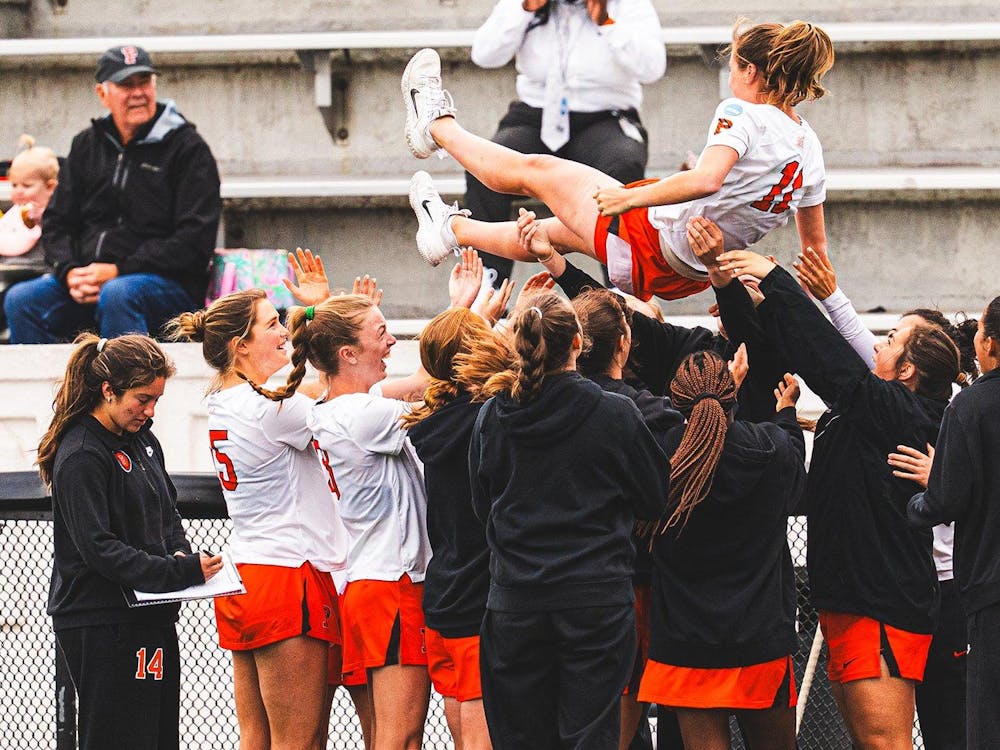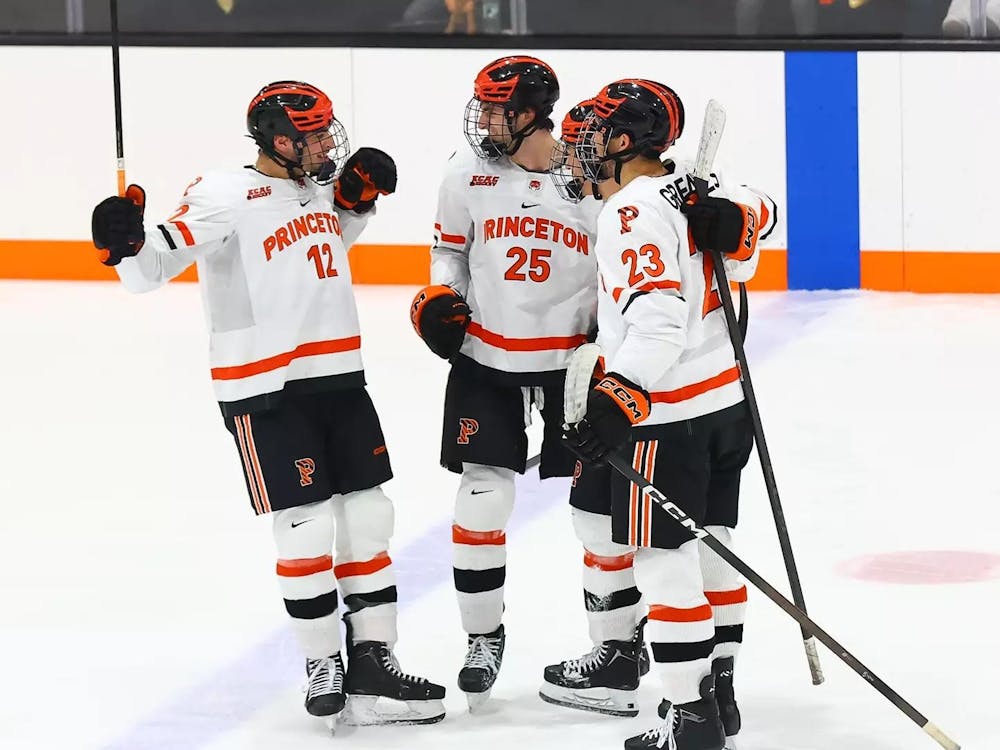WASHINGTON, D.C. — The white-clad fans of the Washington Capitals have worked themselves into a frenzy, frantically waving the white towels they were given upon entering the arena. To the national television audience, the MCI Center resembles a giant bowl of whipped cream. Most of ESPN's viewers, however, aren't paying attention to the crowd.
Instead, all eyes are focused on one player — the Pittsburgh Penguins' indomitable Number 66. After coming out of retirement in December of 2000, Mario Lemieux is playing in his first National Hockey League playoff game since 1997.
Amidst this atmosphere, Wash-ington's Jeff Halpern takes his first shift. Capitals head coach Ron Wilson plans to play Halpern's line against Lemieux's at almost every opportunity. So Halpern, a 1999 Princeton graduate, has now been saddled with perhaps the most unenviable job in hockey. As the center on his line, he will be matched up directly against Super Mario.
Scarcely a minute into the game, with the Capitals' second-year forward already shadowing him all over the rink, Lemieux pulls back both of his arms and buries his left elbow into the side of Halpern's head. The hit carries a message. Mario Lemieux intends to be a force in this series, and he's not going to let some plucky kid from Princeton get in his way.
When the game ends, however, it is Washington that has skated away with a 1-0 victory. Lemieux heads to the dressing room, perhaps the only place where he can find refuge from Halpern's surveillance. Lemieux's line score for Game One of this best-of-seven series: zero goals, zero assists, zero shots. Zero impact.
Another message has been delivered: Jeff Halpern has some pretty high hopes of his own for this year's postseason. And no, he will not be intimidated by Number 66.
Everything came together for Halpern in the first round of this year's NHL playoffs. Goliath got the last laugh — Lemieux finished with seven points in six games to lead the Penguins to a four-games-to-two series victory — but Halpern's performance was an inspiration to his teammates and coaches.

He finished the series with five points of his own, tying him for the team lead in that category. After helping shut out Lemieux in Game One, Halpern outdid himself in Game Four last Wednesday, scoring a dramatic sudden-death overtime goal that gave Washington a 4-3 win and helped temporarily resurrect the Capitals' season.
Over the last two decades, no Princeton athlete has made this big an impact in one of the four major professional sports leagues. On a league-wide level, Halpern has established himself as one of the NHL's top young two-way players. In Washington, he has gone from being an unknown kid with an Ivy League diploma to a bona fide fan favorite — a player the team has begun to rally around.
"He wants to learn — he wants to improve," forward and linemate Ulf Dahlen says. "He's got all the tools to be a good hockey player. I'm not surprised to see that he's growing the way he is."
"Leadership is not necessarily your words, but your actions," Wilson says. "Jeff is certainly determined to do the right things — to do whatever it takes to win a game."

Halpern's NHL saga began inauspiciously — he was undrafted coming out of school. This turned out to be a blessing in disguise, however, since it left him free to sign with any team he could find. Halpern grew up in Potomac, Md., which is about as far from Washington's city limits as Lawrenceville is from Princeton. When the Capitals expressed interest, he suddenly had a chance to play for the team he grew up rooting for.
"The benefit of free agency is you get to choose where you want to go," Halpern says. "Not just because I like the city — where they were as an organization suited me. They needed to fill a few center spots at the time."
Halpern performed well enough at training camp to win a spot on the Capitals' roster at the start of the 1999-2000 season. Still, nobody could have predicted the immediate impact he would make. In March of 2000, he earned NHL Rookie of the Month honors. He finished his rookie campaign with 18 goals and then added 21 more this season.
"It's a question of experience and learning what it takes to score at this level," Wilson says. "He's gotten to the point now where we rely on him to score goals, kill penalties, be on the power play and just about play in every situation."
Still, statistics alone can't adequately describe Halpern's contributions to the Capitals' franchise. When he first made the team in 1999, his local roots made him the feel-good story of the preseason in the Washington sports pages. Halpern is now featured extensively in the many promotional video sketches that appear on the MCI Center scoreboard during games.
And his performance in the playoffs, both this season and last season, has only enhanced his growing legend. If there's one truism about playing hockey in Washington, it is the following: If you want to endear yourself to the home fans, turn your game up a notch against Pittsburgh in the playoffs. If you are from the Washington area — like Halpern —and you've hated the Penguins for as long as these fans have, that's just icing on the cake.
This season marks the sixth time — in seven postseason meetings — that Pittsburgh has knocked the Capitals out of the playoffs since 1991. Halpern, the Maryland native, has of course experienced all of these disappointments — either as a fan or a player. His contempt for all things Penguin has reached a boiling point now that his first two NHL seasons have been ended by Pittsburgh.
Still, the former Tiger has done more than his share to try to avert these seemingly inevitable outcomes. In the first round of the 2000 playoffs — a four-games-to-one Pittsburgh victory over the Capitals — Halpern scored the game-winner in Washington's lone win. This postseason, he was simply one of the best players on the ice for either team.
Despite another frustrating ending, Halpern made the most of this year's series with the Penguins. In a league in which no team felt the need to draft him, he has proven he belongs.
It is Game Four, the series has moved to Pittsburgh's Mellon Arena, and the Capitals now trail, two games to one. By squandering a two-goal lead in the final ten minutes of regulation, Washington has allowed the game to go into overtime. A loss here would put the Capitals in a 3-1 hole in the series, effectively ending their season.
At the outset of the extra session, the ESPN announcers note that Mario Lemieux has never scored an overtime goal in the playoffs. It's as if the script has already been written: Lemieux scores the game-winner. Goodbye, Capitals. Hello, 'Instant Classic.'
But this time, the Capitals come up with a storybook ending that trumps even Super Mario's comeback. They have the local boy who has come home to play for his favorite team. They have the undrafted Ivy Leaguer who is going nose-to-nose with one of the sport's all-time greats. Whatever Hollywood script you choose, Halpern has become more than qualified to play the protagonist. On this night, he seizes the opportunity.
Linemate Steve Konowalchuk battles for the puck behind the goal and slides a picture perfect pass to Halpern, who has moved to the front of the net.
The Capitals are 0-4 lifetime in overtime playoff games against Pittsburgh — a history that Halpern is well aware of. But now, the long-time fan can finally do something about it. He lowers his head and slams the puck at the net as hard as he can.
A split-second later, it's all over, and Halpern is skating back toward his celebrating teammates with his head aimed skyward and his mouth wide open in a pose that exudes both disbelief and joy.
The television cameras quickly zoom in on Lemieux as he exits the rink — and then back to the Capitals' celebration. For the second time in a week, Jeff Halpern has stolen the spotlight from the NHL's biggest name.
The coming out party — two years in the making — is finally complete.







